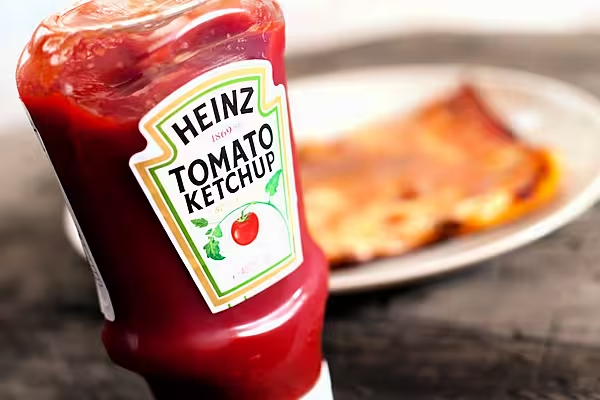Kraft Heinz Co.'s quarterly profit beat expectations as the Tater Tots-maker benefited from tax changes in the United States and raised prices to counter higher input costs, sending shares up 4% after the bell.
Food companies, including Conagra Brands Inc. and General Mills Inc., have flagged higher transportation costs and rising commodities prices in recent months. These companies are also are under pressure to boost sales while the struggling retailers they sell products to clamp down on prices and inventory.
Price Increases
Kraft Heinz, whose brands include Velveeta cheese and Heinz ketchup, said it raised prices in the United States and in other parts of the world, driving overall pricing up by 1 percentage point. Pricing was positive for the third straight quarter.
Net income rose 11.1% to $993 million, or 81 cents per share, primarily reflecting benefits from the biggest overhaul of the US tax code in over 30 years, which slashed the corporate income tax rate to 21% from 35%.
Excluding items, earnings were 89 cents per share, beating the average analyst estimate of 82 cents, according to Thomson Reuters I/B/E/S.
Net sales slipped 0.3% to $6.30 billion in the first quarter ended 31 March as weakening demand for processed foods in the United States more than offset growth in Canada, Europe, the Middle East and Africa. Sales missed expectations of $6.33 billion.
Kraft Heinz has reported muted sales for several straight quarters as US retailers make space on their shelves for fresh food and higher-margin upstart brands such as Sir Kensington's or Portlandia Foods.
Empty M&A Pipeline
Kraft Heinz's stock has lost 42% in value since its failed takeover bid for Unilever Plc last year. Its private equity backer 3G is known for driving sales through acquisitions.
"If another deal isn't imminent, what's the next phase of growth? They're under pressure to deliver sales," Edward Jones analyst Brittany Weissman said, noting frustration and impatience among shareholders about the company's empty merger and acquisition pipeline.
To prove to investors that it can grow through innovation, Kraft Heinz has been investing in e-commerce and food and beverage startups, joining a growing list of US food companies looking at new ways to spur growth. Finance chief David Knopf said the rise in first-quarter pricing also helped make up for higher expenses from the company's aggressive commercial investment plans.
Changing consumer habits and retail industry woes due to online competition are some of the hurdles to Kraft Heinz making an acquisition, Weissman added.
News by Reuters, edited by ESM. Click subscribe to sign up to ESM: European Supermarket Magazine.














